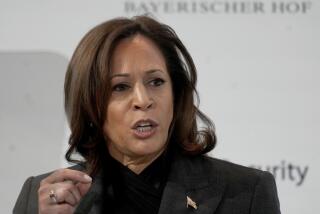U.S. Cautions Russia on Tactics in Chechnya
CAMBRIDGE, Mass. — A top U.S. official warned Moscow on Friday that using indiscriminate force against civilians to quell guerrilla groups in Chechnya threatens Russia’s fragile democratic structures and, by implication, its working relationship with the West.
Calling the fast-unfolding crisis in the Caucasus Mountains a “moment of truth for the new Russian state,” the Clinton administration’s Russia expert, Deputy Secretary of State Strobe Talbott, acknowledged that Moscow has the right to defend its territorial integrity.
But he said Russia’s leaders must protect the rights of the many minorities within its huge and disparate federation. To do otherwise, he cautioned, could undermine efforts to establish democracy in Russia.
Talbott’s comments, made in a speech at Harvard University, marked the latest in a series of high-profile statements on Russia by senior Clinton administration officials. His remarks constitute the administration’s most forthright public criticism of Russia’s military action in Chechnya since the crisis in the separatist republic erupted anew several weeks ago.
Talbott specifically condemned the actions of Russian officials who have blamed “people of darker complexion” for a wave of terrorist bombings of apartment complexes in Moscow and other cities. Those accusations were followed last week by the roundup and deportation from the Russian capital of about 10,000 residents of Caucasian origin.
“This is not just an ugly and atavistic development but an ominous one,” he said. “For there to be any chance of success [in resolving the crisis], Russia must show restraint and wisdom in coming days and weeks. That means taking action against real terrorists, but not using indiscriminate force that endangers innocents or resuming the disastrous 1994-96 war in Chechnya.”
The Russian republic has been virtually independent since Chechen rebels defeated Russian soldiers in that war. Russia’s warplanes have bombed Chechnya in recent weeks and its troops set up posts inside the republic Thursday in an effort to defeat Islamic rebels who have attacked the neighboring republic of Dagestan.
In his speech, Talbott called on Moscow to open a political dialogue with moderates from the region.
Ironically, the warning on Chechnya came within the context of an otherwise remarkably upbeat assessment of Russia’s uncertain journey toward democracy--a journey Talbott called “rocky, messy, suspenseful, even dangerous.”
Despite a flurry of crises and a precarious economy that seemingly have taken the former superpower to the brink of collapse, he said, “Russia has begun a transformation that may, over time, take it in just the opposite direction.”
As evidence, he cited two factors:
* Moscow’s willingness, for the first time in modern history, to work constructively with the West on a number of issues, including the search for peace in the Balkans, resolving the conflict in the Caucasus enclave of Nagorno-Karabakh and entering into a formal agreement to recognize Ukraine’s sovereignty.
* The increasing attachment on the part of individual Russians to the idea of electing their own leaders.
“There now seems to be a fundamental commitment of major politicians--you could even call it a social contract--to sorting out their differences through electoral democracy,” he said.
Congressional Republicans have attacked President Clinton’s Russia policy as the nation’s worst foreign affairs debacle since Vietnam.
Respected nongovernment specialists in the United States were divided in their response to Talbott’s assessment. Harvard historian Richard Pipes, noting what he called “a yearning for a strong hand to bring order” on the part of many Russians, labeled Talbott’s assessment overly optimistic.
But Coit Blacker, a former White House advisor on Russia policy now at Stanford University’s Institute for International Studies, agreed with Talbott.
“If you take four or five steps back and assess the general trajectory of where things are going, there is very good news in this,” Blacker said. “It’s part of the story we’re not paying enough attention to.”
More to Read
Sign up for Essential California
The most important California stories and recommendations in your inbox every morning.
You may occasionally receive promotional content from the Los Angeles Times.










